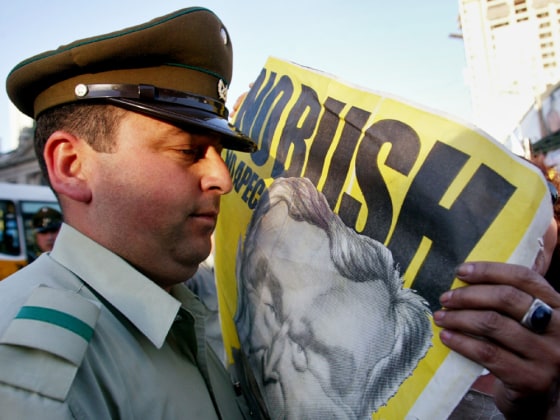In his first international trip since winning a second term, President Bush heads to an Asia-Pacific summit in Chile with a full agenda that will shape America's future economic and national security.
The top issues for leaders gathering in Santiago on Saturday and Sunday at the Asia-Pacific Economic forum include the economy, terrorism, nuclear proliferation, immigration, and trade.
"The president will be traveling there to demonstrate our strong commitment to engagement with the Asia-Pacific region," said White House spokesman Scott McClellan. "APEC represents nearly half of the world's population, 60 percent of world GDP and nearly half of world trade."
The summit offers the president an opportunity to meet face-to-face with world leaders. He plans to host bilateral meetings with the leaders of Canada, Chile, China, Japan, Mexico, South Korea, as well as others, according to White House aides.
North Korea nukes
One of the largest security threats to the region beyond terrorism is nuclear proliferation in North Korea.
A senior administration official said North Korea's nuclear programs will be "at the top of the agenda" as the president meets with South Korean President Roh Moo-Hyun, Chinese leader Hu Jintao, Japanese Prime Minister Junichiro Koizumi, and Russian president Vladimir Putin.
"This is an opportunity to use the meetings to start getting down to the business of getting North Korea to give up its weapons programs," the official said, who briefed the media on condition of anonymity.
The North Korean nuclear issue has been a main topic at previous APEC summits, but Pyongyang has ignored appeals to abandon its nuclear weapons programs.
Two years ago at Los Cabos, Mexico, the 21 APEC leaders called for a nuclear-free Korean peninsula. They also agreed that North Korea's security concerns should be answered.
Diplomats are eager to jumpstart talks with North Korea after negotiations stalled after the last round of meetings in June. North Korea has said it won't return to the table until the U.S. changes what it calls a "hostile policy."
China and South Korea have been urging the United States to take a more flexible approach to North Korea and make some concessions.
Traveling in Los Angeles on Nov. 12, the South Korean president warned the U.S. that taking a hard line over North Korea's nuclear weapons program would have "grave" consequences.
The White House did not express concern at Roh's comments.
"The key now is to get the North Koreans to respond to the proposal that we, the U.S., put forward in the last session, which is a proposal for how we'd resolve this in a way that eliminates all the programs — uranium, plutonium — and also opens up possibilities for [the North Koreans] to enjoy better relations not only with their neighbors, but with us," the official said.
Immigration from Mexico and the economy
The president also plans to revive his immigration initiative when he meets with Mexican president Vicente Fox. Bush had pledged to expand a guest-worker program between the U.S. and Mexico, but talks broke down after the Sept. 11, 2001, terrorist attacks.The president meets with Fox on Sunday.
Bush's top political advisor, Karl Rove, has said the president's plans to try once again and push his plan through Congress. It failed to pass last year because of opposition from conservatives in the president's own party.
Some APEC leaders have also signaled they intention to flag the record U.S. deficit, which is expected to exceed $600 billion this year.
Upon departing Chile, the president will travel to Cartagena, Colombia, to meet with Colombian President Alvaro Uribe.
A senior administration official said the president "looks forward to discussing with President Uribe the many ways the United States and Colombia are working together as close allies to protect and promote democracy, human rights and the rule of law, fight terrorism and drug trafficking, and promote prosperity through economic growth and opportunity."
